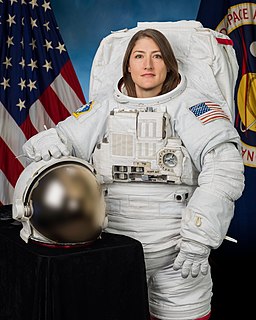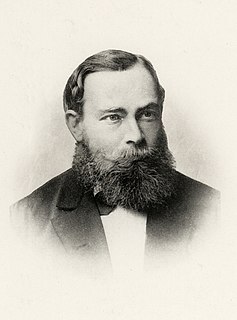Ein Zitat von Christina Koch
Ich habe Arbeiten in voller Kälteausrüstung durchgeführt, die an wissenschaftlichen Türmen in der Antarktis und der Arktis hingen. Kleine, heikle Aufgaben an wissenschaftlichen Geräten tatsächlich erledigen zu müssen, ohne Geschicklichkeit oder taktiles Feedback zu haben, ist etwas, das sehr übertragbar ist.
Verwandte Zitate
Leider weist dieses idealisierte Bild der Art und Weise, wie die wissenschaftliche Gemeinschaft die Wahrheit entdeckt, einen gewissen Fehler auf. Und der Fehler besteht darin, dass die meisten wissenschaftlichen Arbeiten nie Beachtung finden. Eine Studie nach der anderen hat gezeigt, dass die meisten wissenschaftlichen Arbeiten von fast niemandem gelesen werden, während eine kleine Anzahl von Arbeiten von vielen Menschen gelesen wird.
Leider betrachten Wissenschaftsphilosophen den wissenschaftlichen Realismus und den wissenschaftlichen Antirealismus meist als monistische Lehren. Die Annahme ist, dass es ein Ziel aller wissenschaftlichen Schlussfolgerungen gibt: Aussagen zu finden, die wahr sind, oder Aussagen zu finden, die prädiktiv genau sind. Tatsächlich gibt es mehrere Ziele. Manchmal ist Realismus die richtige Interpretation eines wissenschaftlichen Problems, manchmal aber auch Instrumentalismus.
Da sich die Kriegshandlungen größtenteils abseits der Bühne abspielen, wollte ich den Charakteren etwas geben, mit dem sie täglich zu kämpfen haben, eine Art Hindernis. Das Wetter schien der einzige große Ausgleich zu sein, unabhängig von der Position im Leben – wenn es schneit, ist jeder bis zu einem gewissen Grad belästigt. Außerdem ist es fühlbar, witterungsbedingt und wirkt sich auf die Haut aus.
Die Verantwortung für die Schaffung neuer wissenschaftlicher Erkenntnisse – und für den Großteil ihrer Anwendung – liegt bei der kleinen Gruppe von Männern und Frauen, die die Grundgesetze der Natur verstehen und sich mit den Techniken der wissenschaftlichen Forschung auskennen. Je nachdem, wie viele hochqualifizierte und ausgebildete Wissenschaftler es erforschen, werden wir auf jedem wissenschaftlichen Gebiet schnelle oder langsame Fortschritte machen.
Der wahrhaft wissenschaftliche Geist hat überhaupt keine Angst vor dem Neuen, und auch wenn er kein Mitleid mit Ideen hat, die ausgedient haben oder sich als nutzlos erwiesen haben, wird er keinem unbekannten Konzept den Moment voller und freundlicher Aufmerksamkeit gönnen, in der Hoffnung, es zu erweitern, anstatt es zu erweitern Minimieren Sie den kleinen Kern an Nützlichkeit, den es möglicherweise enthält.
Nach Jahren der Arbeit in beiden Studienbereichen kam ich zu dem Schluss, dass sich die Sozialwissenschaften in vielerlei Hinsicht von den Naturwissenschaften unterscheiden, dass aber in beiden Bereichen dieselben wissenschaftlichen Methoden anwendbar sind und dass es sich tatsächlich um keine sehr nützliche Arbeit handelt in beiden Bereichen möglich, außer mit wissenschaftlichen Methoden.
Im wissenschaftlichen Denken funktioniert das Konzept umso besser, als es von allen Hintergrundbildern losgelöst ist. In seiner vollen Ausübung ist das wissenschaftliche Konzept frei von allen Verzögerungen seiner genetischen Evolution, einer Evolution, die folglich durch einfache Psychologie erklärt werden kann. Die Kraft des Wissens nimmt mit jeder Eroberung der konstruktiven Abstraktion zu.
Evidenzbasiertes Denken liegt jedem wissenschaftlichen Denken zugrunde und beinhaltet das Testen von Hypothesen oder Theorien anhand von Daten. Die Validierung einer Theorie erfordert reproduzierbare Messungen unabhängiger Gruppen mit unterschiedlichen Geräten und Analysemethoden. Die Konvergenz der Beweise ist entscheidend für die Akzeptanz einer wissenschaftlichen Idee.
Vivisektion ist nicht dasselbe wie wissenschaftlicher Fortschritt. Es gibt so etwas wie wissenschaftlichen Fortschritt. Aber diese umfassende Hingabe der Wissenschaftler an die Vivisektion, die eine einfache und kostengünstige Möglichkeit darstellt, hindert sie tatsächlich am wissenschaftlichen Fortschritt, denn wahrer Fortschritt ist schwierig und erfordert von seinen engagierten Mitarbeitern Genie und Vorstellungskraft.
Wenn Baltimores Ansicht, dass Wissenschaftler, die den Worten von Autoritäten nicht folgen, weit vom normalen Verhalten von Wissenschaftlern entfernt sind, in der wissenschaftlichen Gemeinschaft vorherrscht, dann geschieht etwas Grundlegendes, sehr Ernsthaftes und sehr Beunruhigendes für die wissenschaftliche Gemeinschaft.
Wissenschaftliche Kompetenz ist eine der Grundlagen von allem, was ich tue. Deshalb arbeite ich mit Schulen zusammen. Deshalb unterrichte ich an der Universität. Ich unternehme viel Öffentlichkeitsarbeit, um die allgemeine wissenschaftliche Grundbildung zu verbessern, aber der Kern jeder wissenschaftlichen Grundbildung ist einfach nur die Lese- und Schreibfähigkeit.
Wir dürfen nicht vergessen, dass bei der Entdeckung von Radium niemand wusste, dass es sich in Krankenhäusern als nützlich erweisen würde. Die Arbeit war reine Wissenschaft. Und dies ist ein Beweis dafür, dass wissenschaftliche Arbeit nicht unter dem Gesichtspunkt ihres unmittelbaren Nutzens betrachtet werden darf. Es muss für sich selbst getan werden, für die Schönheit der Wissenschaft, und dann besteht immer die Chance, dass eine wissenschaftliche Entdeckung wie das Radium zu einem Nutzen für die Menschheit wird.

































